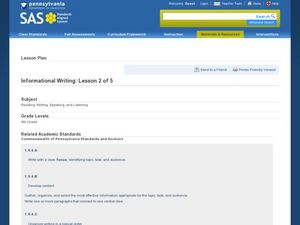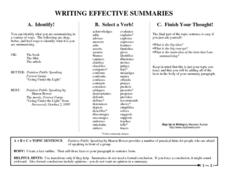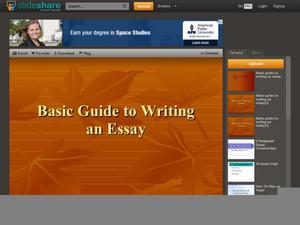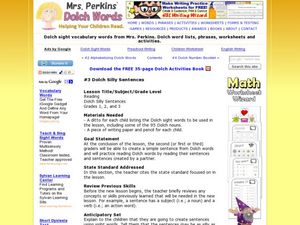Curated OER
Outlines and Organization: Sample Outline
Provide your essay writers with a sample essay outline. Richly detailed, this two-page handout not only describes the necessary parts of an outline, but also explains the purpose of each section. A model outline is also included.
Curated OER
Paragraph Structure
Make sure your writers have the buns and the meat in their paragraph burgers with paragraph exercises. The resource gradually leads up to individuals writing their own paragraphs, starting with identification exercises, moving on to...
Curated OER
"Monsters Are Due on Maple Street" by Rod Serling
These questions ask learners to think about the text "Monsters Are Due on Maple Street" in a variety of ways. In addition to practicing reading comprehension, class members work on interpreting, making inferences and connections,...
Trinity University
Explain Yourself: An Expository Writing Unit for High School
Introduce expository writing with a unit that asks writers to craft an essay to explain a belief, value, or priority that is important to them. Mini-lessons within the unit focus on crafting thesis statements and conclusions, selecting...
Curated OER
Preparing for the WPE
Prepare your soon-to-be graduates to take the Writing Proficiency Examination given at Cal Poly. These slides cover everything from the various types of questions to writing thesis statements. This is more like an overview than a...
Pennsylvania Department of Education
Informational Writing: Lesson 2 of 5
Introduce expository writing to your elementary learners. Young authors write a three-paragraph informational paper using the steps of the writing process. They follow guided lessons to experience each of five steps. Included are tons of...
Curated OER
The Little Prince: Socratic Questioning Strategy
Challenge readers to read closer in an activity based on the Socratic questioning strategy. As kids read Antoine de Saint Éxupery's The Little Prince, they use sentence starters to ask deeper questions about the text, and...
Curated OER
Paragraph Lesson
Students write paragraphs with topic sentences and supporting details. In this paragraph writing instructional activity, students fix sentences and paragraphs. Students also write a paragraph that includes an introduction, supporting...
K5 Learning
Liza's First Spelling Bee
Learners read about Liza's first spelling bee before answering six reading comprehension questions. Skills include identifying similarities, making inferences, drawing conclusions, and answer questions based on explicit information in...
Curated OER
Conditional Statements and Converses
In this conditional statements and converses worksheet, 9th graders solve and complete 10 various types of statements as instructed. First, they identify the hypothesis and conclusion of the conditional statement given. Then, students...
Pennsylvania Department of Education
Analyzing Key Ideas and Details in Nonfiction
Students explore nonfiction texts. In this language arts lesson, students read a nonfiction text and make predictions. Students identify facts and opinions in the text and draw conclusions as they read.
Curated OER
Subjects and Predicates
Sixth graders explore writing techniques by reviewing sample sentences. In this writing subject lesson, 6th graders examine a list of sentences in which they identify both the subject and predicate. Students complete a subject and...
Anchorage School District
Writing Effective Summaries
Drafting a strong first sentence for a summary is an important step. Writers can use the formula presented on this handout to get started. The resource lists three steps to put together a strong topic sentence, as well as tips and hints...
Curated OER
Basic Guide to Writing an Essay
Introducing your class to essay writing? The gentle tone, concise explanations, and clear examples provided by a 17-slide presentation introduces young writers to the expository essay format. All that's missing is a complete essay with...
Curated OER
How to Write A+ Essays!
This lesson, which promises to improve the essays of your middle schoolers, contains a list of characteristics an essay should include. It breaks it down into the introduction, thesis statement, body, etc. There's also a list of things...
Curated OER
Animation Pre-Production
Does your class love reading cartoons? Use their talents and interests to examine the process of writing a story they wish to tell through a cartoon. They develop the beginning, middle, and end of a story based on their original...
Curated OER
Essay Writing
Are your learners working towards their GED? First they study the GED essay rubric, and then they read a sample essay as a group. After studying the basic elements, they write an essay of their own. After peer editing, they revise their...
Curated OER
Practice Writing and Evaluating Conclusion Paragraphs
In this writing conclusions instructional activity, students practice writing and evaluating paragraphs written at the end of an experiment. They are given a hypothesis and a results sentence and they write a conclusion.
Curated OER
Introductions and Conclusions
Students discuss the importance of writing clear, well structured essays. They explore the use of introductions and conclusions when writing an essay. Students compose an essay using both introductions and conclusions.
Curated OER
Mrs. Perkins' Dolch Words: #3 Dolch Silly Sentences
Students practice word recognition skills. In this dolch sight word instructional activity, students arrange sight words to create silly sentences that are grammatically correct.
Curated OER
Making Inferences and Drawing Conclusions
Second graders make several inferences based on the reading of Shel Silverstein poems. They write their own poetry and complete an assessment in which they differentiate between sentences that are stated or inferred.
Curated OER
Story Endings
In this story endings learning exercise, students read six 2-sentence illustrated stories. Students decide if the ending seems logical and write "yes" or "no" under each story.
Have Fun Teaching
Scientific Method
Encourage your students' inner scientist by conducting experiments and recording their findings. This printable incorporates every part of the scientific method into an easy-to-read outline of experimental questions, research,...
Curated OER
Cause And Effect
Fourth graders read the book Stellaluna and cite sentences that show cause and effect in the story. In this cause and effect lesson plan, 4th graders also write sentences that show cause and effect in their own lives.

























